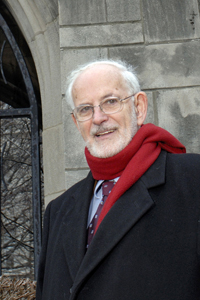Hospital to award Lindheimer for research that aids mothers, infants
By John Eastonjohn.easton@uchospitals.edu
Medical Center Communications
 Photo by Beth Rooney Marshall Lindheimer will be honored for his research on preeclampsia with the 2009 Joseph Bolivar DeLee Humanitarian Award. |
|
An internationally recognized authority on kidney disease and hypertension during pregnancy, Marshall Lindheimer, Professor Emeritus in Obstetrics & Gynecology, will receive the 2009 Joseph Bolivar DeLee Humanitarian Award from the Board of Directors of Chicago Lying-in Hospital, part of the University Medical Center.
Named after DeLee, a pioneer in the field of obstetrics and founder of the Chicago Lying-in Hospital, the award is presented annually to an individual who has made extraordinary contributions to the health care of women and infants.
Previous winners include M. Jocelyn Elders, the first African American appointed as Surgeon General of the United States; Robert Edwards, the scientist who made in-vitro fertilization possible; as well as Georgeanna Seegar Jones and Howard Jones, who together opened the first successful in-vitro fertilization clinic in the United States.
“Marshall Lindheimer has changed the way we think about the kidney during pregnancy,” said Arthur Haney, Professor and Chair of Obstetrics & Gynecology. “He brought a new level of rigor to the study of hypertension, especially during pregnancy, and in the process has taught us all a lot about how the kidney responds to the unusual physical stresses related to reproduction. He also is a devoted clinician, sought after by other physicians for his expertise in medical problems during pregnancy.”
One of the world’s leading authorities on kidney function, blood pressure control and water-level maintenance during pregnancy, Lindheimer is widely known for his research on preeclampsia, a form of hypertension that remains a leading cause of maternal and fetal mortality worldwide.
In collaboration with Adrian Katz, Lindheimer described how the kidney re-absorbs the large increases in filtered sodium during pregnancy. With another University colleague, Edward Ehrlich, Lindheimer elucidated the roles of the hormones aldosterone and progesterone in sodium and potassium regulation during pregnancy.
Working with John Davison, of Newcastle upon Tyne University, England, Lindheimer mapped out how regulation of the hormone vasopressin affected fluid retention during pregnancy. Understanding this process led them to predict the existence of an as-yet-unrecognized disease, now known as “transient diabetes insipidus during pregnancy.” After finding such patients, they were able to treat them.
More recently, he has focused on clinical trials and translational studies designed to prevent preeclampsia, such as large multicenter randomized trials testing low-dose aspirin and supplemental dietary calcium to prevent this disease. He also was involved in a large observational trial centered in underdeveloped nations to determine if measuring circulating antiangiogenic proteins could predict preeclampsia.
“By bringing the subject of the kidney and pregnancy to the attention of internists and obstetricians in a readable and comprehensible way, and by his own contributions to our collective base of knowledge, he has made an outstanding contribution that has directly impacted the care of patients with renal disease and changed the clinical practice of nephrology,” said Arthur Herbst, the Joseph B. DeLee Distinguished Service Professor Emeritus in Obstetrics & Gynecology.
The DeLee Award is presented each year by the Chicago Lying-in Hospital Board of Directors, which supports programs to advance education, research and patient care relating to women and infant health.
DeLee was a leading advocate for greater safety in childbirth. His concern for women in labor led him to open a small dispensary on Chicago’s Maxwell Street in 1895, which became known as the Chicago Lying-in Hospital and Dispensary. The facility and its services grew in size and reputation. In 1931, DeLee opened the 140-bed Chicago Lying-in Hospital on the Medical Center campus and became the first chairman of obstetrics and gynecology at the University of Chicago.
The award will be presented Saturday, March 7 at the board’s annual dinner.
![[Chronicle]](/images/sidebar_header_oct06.gif)